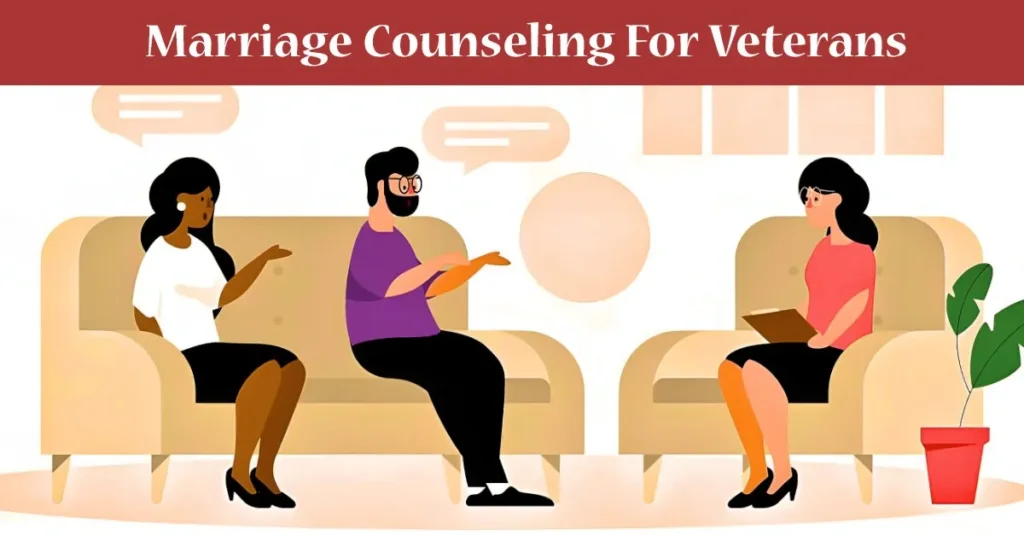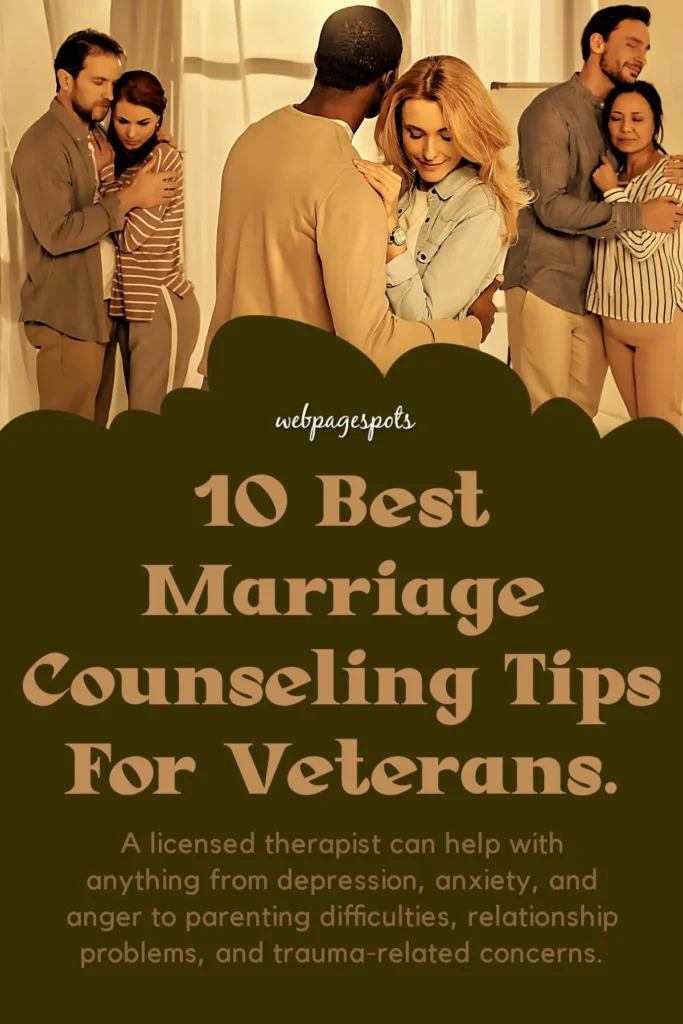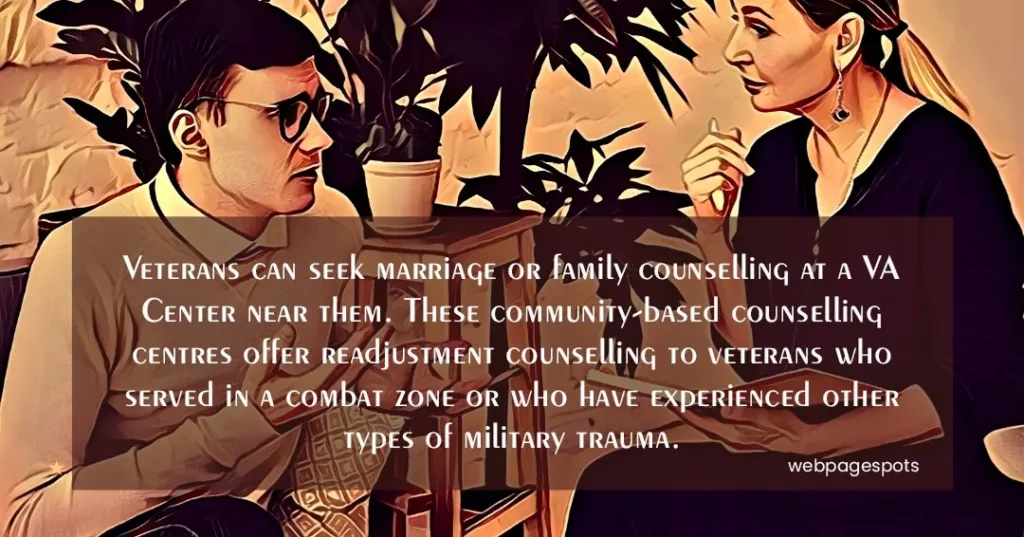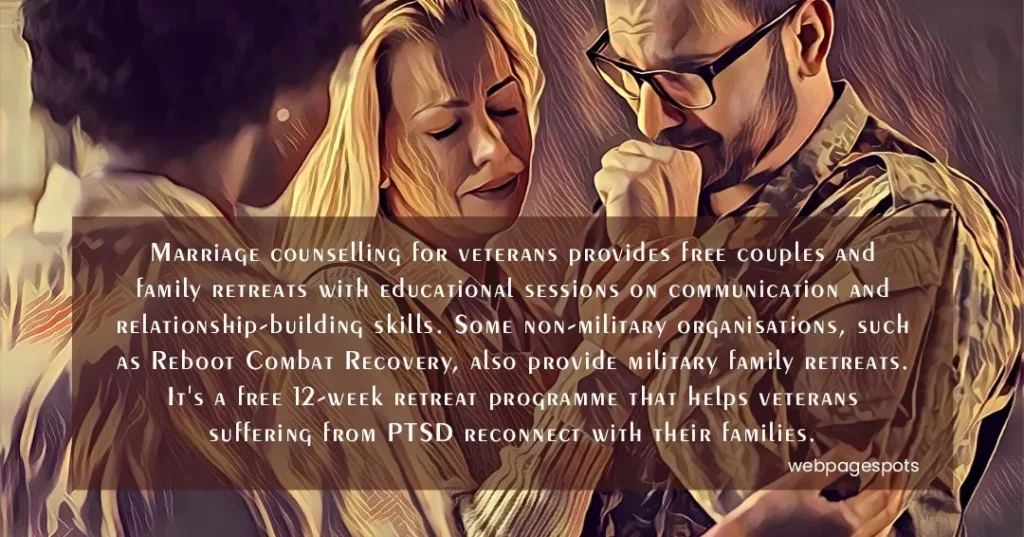The 10 best marriage counseling tips for veterans: 18 benefits to claim!
This blog post may contain affiliate links. If we find a product or service to be useful, we encourage you to visit the website via that link. If you make a purchase through our referral link, we may receive a commission. Rest assured, you will not be charged any additional fees. By using these links, you can support us while making your purchase. For more information visit here.
Being married can be difficult for veterans because their jobs demand special duties. Thus, a lot of veteran couples find they need help from marriage counseling to deal with these challenges. It’s all about making their relationship stronger and healthier.
After coming back from deployment, veterans might have a lot of emotional struggles when adjusting to civilian life, which makes things hard for some of them.
If you’re a veteran having a tough time in your marriage, going for counseling sessions can make a difference. This article will explain why counseling is beneficial for people and give you 10 tips on how to do it well.
Let’s dive deeper.
A veteran’s guide to marriage counseling: Tips for making it through!
John and Amy, a couple in their late twenties, go to marriage counseling after experiencing some difficulties in their relationship. They consulted a counselor specializing in veterans, who provided helpful advice on improving their relationship.
The counselor told them to be honest, be nice, and think about the good parts of their marriage. They found counseling useful because it helped them understand each other better and improved their relationship.
Now, even though they’re happily married, they still have a lot of work to do. John and Amy recommend seeking counseling for any veteran couple to ensure the right fit.
Some basic tips to help veterans through
Marriage counseling for veterans can be a true lifeline for couples struggling to stay together. It meant there would be a separation or a divorce. Unfortunately, a lot of veterans might not know much about counseling, so it can make them feel lost or stressed out.

With the right tips and support, veterans can enjoy counseling and find creative ways to rebuild their relationships.
So don’t let pessimism stand in your way. Reach out for help today and start your journey towards marital harmony. To help veterans make the most of their marriage counseling, here are some essential tips to help them through:
1. Prepare for the session.
Before attending the session, it’s wise to think about what you would like to get out of counseling. Think about the areas where you and your spouse need the most help. Be prepared to be honest about any issues you’d like to work on.
2. Be open to suggestions.
Marriage counseling is a collaborative process. Both parties should be open to the suggestions of their counselors. Listen to your spouse’s opinion and be willing to compromise.
3. Keep marriage counseling private.
Understanding that marriage counseling should remain private is crucial. Respect your counselor’s advice and be mindful of your surroundings.
4. Set goals.
Have a clear idea of what you’d like to accomplish during the session. Draft your goals and have a plan for achieving them.
5. Be patient.
It is critical to understand that change does not occur by chance. Ensure you are patient and committed to the process.
If you’re still unsure about marriage counseling for veterans, keep in mind that its purpose is solely to provide relief. With the right approach and effort, you can make it through difficult times and build healthy relationships.

10 tips for marriage counseling for veterans
You may discover, as a veteran, that discussing your marriage with someone strengthens it. Whether you’ve recently gotten married or things are difficult, talking about them may be beneficial.
These pointers will enable you to identify the difficult aspects of serving in the military and choose the right person to speak with. You’ll learn how to make sure your marriage is solid and identify and address issues in your marriage.
With the right knowledge, you may have the skills you need for a happy and healthy marriage. Let us thus endeavor to improve our connections! For troops, hoping to maximize the benefits of discussing their marriage, consider these 10 options.
1. How to choose a marriage counselor.
When it comes to marriage counseling, veterans face unique problems. If you’re a veteran in search of marriage counseling, there are several aspects to consider depending on your circumstances.
1. Identify your goals.
Decide what you and your partner want to accomplish in marriage counseling. This will help you focus your search for a marriage counselor who specializes in the areas you need.
2. Identify potential counselors.
Ask your friends and family for referrals, or search online for qualified marriage counselors in your locality.
3. Verify a counselor’s credentials.
Make sure the marriage counselor you choose is certified and accredited.
4. Ask questions.
Contact potential marriage counselors to get more information about their approach, experience, and prices.
5. Consider chemistry.
Once you’ve narrowed down your choices, consider whether you and your partner feel comfortable and safe discussing issues with a marriage counselor.
6. Select a counselor.
Be 100% sure to select a marriage counselor who is a compatible fit for both you and your partner.

2. Take a serious look at your opinion about counseling.
Be honest with yourself and your spouse about why you’re going for counseling and what you hope to gain from it—be open-minded and willing to explore various things.
Once you’ve decided counseling is the last resort, you’ve got to get a therapist who specializes in your case and is familiar with veterans’ special needs.
Marriage counseling may seem like a boring prospect for a veteran. After all, veterans are adept at hardship, and the idea of seeking help from an outside source may feel like a sign of weakness.
Yet, for many veterans, marriage counseling can be the key to saving their marriages and restoring their relationships.
Examine your feelings about counseling and determine whether it benefits your marriage.
Many couples turn to marriage counseling when they struggle with communication or other issues in their relationship—from person to person. Counseling can provide a safe space for military couples to work through their twists and turns in a respectful and non-judgmental environment.
When considering marriage counseling, it’s vital to understand the process. Many couples choose to see a marriage counselor who is a licensed professional—and naturally, you should too. The counselor will provide a comfortable, judgment-free zone where teams can work through their issues.
Then the therapist assists the couple in analyzing their relationship dynamics and pinpointing any communication or behavior patterns that need attention.
Understanding the significance of confidentiality in the counseling process is also critical. The counselor should provide a courteous, private setting, knowing both partners’ explicit requirements.
As a result, the therapist will consider any communication problems or other concerns that the veteran is experiencing. If you are a veteran seeking marriage counseling, be open to the idea and commit to the process.
With the correct counselor, marriage counseling can provide veterans with the support and direction they need to manage the issues they confront in their relationships.
Veterans who consider marriage counseling should take the time to research the process. They should also consider their own opinions about the concept of counseling.
3. Start with a “blame-free” discussion.

Marriage is not easy, especially for veterans. You know this well. Despite trying hard, many marriages face troubles.
If you, as a veteran, are having marriage struggles, counseling can help. It is a useful tool to solve your issues.
Before counseling begins, set the right tone. Aim for blame-free talks. This lets both openly share feelings without judgment.
Focus on the present and future. Find the root causes of marriage issues—do not dwell on the past.
Also, agree on some basic rules for the session, like not calling each other names or saying mean things. This way, both people can talk to each other with respect.
As a veteran, you may have learned to repress your feelings in order to cope with difficult situations. Yet, it is okay to express your emotions in a marriage counseling session. Allow yourself to be honest and open with your spouse, and encourage them to do the same.
Acknowledging and understanding your feelings towards one another can be a powerful way to work towards healing and enhancing your marriage.
Remember that marriage counseling is not a “quick fix”—it is a process that requires dedication and patience from both parties.
Take your time, and recognize that it’s okay to make mistakes. Don’t be afraid to take a break from counseling sessions if needed. It’s helpful to pause for a moment to step back and reflect on the progress made.
As a veteran, you know how important it is to keep trying and never give up. If you’re patient and understanding, marriage counseling can be helpful in improving your marriage.
Don’t wait. If you and your spouse are struggling in your marriage, just reach out for counseling. If you both work hard and understand each other, things will get better for both of you.
4. Set some ground rules for the first couple of sessions.
Marriage counseling is an essential tool for veterans who are experiencing marital problems. If you and your partner are thinking about marriage counseling, it is critical to establish certain ground rules.
This will ensure that the first few sessions are productive and helpful.
To begin with, the expectation from both parties is to be respectful and honest with one another.
This means people should not withhold their feelings or thoughts, but just be open. They should also be publicly available so that their partner can respond.
Second, couples will focus on their own problems rather than blaming one another. Each person must accept responsibility for their thoughts, feelings, and acts without pointing fingers at the other.
Third, couples must try to find mutually beneficial solutions, not unilateral ones. A willingness to compromise will be essential for both partners to come to an agreement that addresses their respective needs and expectations.
Fourth, couples will be patient and understanding of one another. This implies they should be open to hearing each other’s points of view and respecting their differences, rather than expecting their partner to change overnight.
Finally, couples will be open and honest throughout the process. No matter how hard conversations may become, partners should still be willing to communicate openly in that atmosphere.
By establishing these ground rules, both partners can enter marriage counseling confident that their relationship will receive the attention and respect it deserves.
Also, the goal of the sessions is to create positive, lasting change. Implementing these principles can have a significant impact on couples’ marriage counseling sessions, fostering growth and understanding.
5. Know what your expectations are of the counselor.
Getting married is a big decision and can be a significant source of joy and happiness. However, if problems arise in a marriage, seeking the advice of a marriage counselor is a wise decision.
As a veteran, you may have some additional considerations when selecting a marriage counselor and working with them. Here is a veteran’s guide to marriage counseling for what to expect.
The most important thing is to understand that marriage counseling is not a “fix-all,” one-night solution. You must have realistic expectations of the counselor and what they can do for your marriage.
Marriage counseling is not a magical fix for your wedding. Instead, it is a process that can help you better understand each other and work through your differences.
Second, know that your marriage counselor is not a judge or a decision-maker. Your marriage counselor facilitates communication and understanding between you and your partner.
However, their presence does not entail giving you instructions or making choices on your behalf.
Third, trust that your marriage counselor has your highest interests at heart. Your marriage counselor is on hand to help you find common ground in your relationship.
Fourth, your marriage counselor can only help you if you are honest and open with them about your issues and feelings.
Fifth, make certain that both of you are on board. The spouse’s partner must remain dedicated to the procedure, no matter how successful it is.
Aside from that, it is also helpful to be clear about what you expect and need from the counselor to ensure that they tailor their services to your specific needs.
Sixth, be patient. Marriage counseling takes time, and you won’t see results overnight. You will see positive changes in your relationship once you trust the process.
For veterans, working with a marriage counselor teaches you how to communicate better, set healthy boundaries, and build stronger relationships. During marriage counseling, the counselor will walk you through discussing the problems.
Finally, find out the costs associated with marriage counseling, as they can vary depending on the type of counseling and the length of the sessions. However, some veterans’ benefits may cover the cost of marriage counseling.
Also, contact your local VA (Veterans Affairs) for more information on how to get the most out of marriage counseling and work toward a healthy marriage.

6. Look for consistency in goals and treatment style.
Being a veteran who wishes to seek marriage counseling might be difficult. Remember that the purpose of marriage counseling is to assist couples in working through challenges and strengthening their relationship.
Having a skilled marriage counselor can make things much easier for veterans. Maintaining consistency will ensure that you receive the best possible care for your unique needs.
So when veterans attend marriage counseling, they should ensure consistency in their goals and treatment approach—the most significant factor when choosing a counselor.
For instance, if a couple is seeking counseling to save their marriage, they should contemplate whether they are also seeking therapy to maintain their family. Ignoring your family members while organizing your wedding is not a healthy course of action.
The primary thing veterans should look for is a therapist who understands the military and its culture, as well as post-traumatic stress disorder. (if you belong to the military)
The study concluded that treating people with PTSD and their spouses individually is the right approach for addressing both the symptoms of PTSD and those of their spouses. The therapist treats both partners in a couple as individual cases, tailoring their approach to each partner’s needs.
Spouses without PTSD can benefit from these sessions. The most effective treatment is also collaborative and heavily emphasizes communication skills.
In sessions, ask questions and ensure you understand the counselor’s approach and how it applies to your situation. Remember again that couples counseling is a process that may take time—keep working even if you don’t see results right away.
Marriage counseling often involves experimenting with various strategies, such as communication exercises or therapeutic activities. Therefore, you need to look after yourself, as marriage counseling can also be emotionally draining. Take a pause whenever you need it.
These suggestions will assist you in receiving the highest quality marriage counseling available—because now you are more aware than ever. For a veteran, finding a marriage counselor you can rely on is critical—remember that you are in charge.
If something doesn’t feel right or you have any worries, speak out. With the right marriage counseling and a dash of patience, you and your spouse can resolve your issues and strengthen your relationship.
7. Be realistic about how much you can give.
Be realistic about how much you can contribute. Being honest with yourself is crucial to preventing setting unrealistic expectations for your marriage and experiencing disappointment.
Be open and willing to compromise. Expectations should be flexible, not rigid, so that you can better address conflict areas within your marriage.
Be vocal about your needs and expectations. Marriage counseling provides an opportunity to have candid conversations about your marriage’s current state and determine the significant actions for its improvement.
Be honest. Marriage counseling is not the place to keep secrets. You should disclose anything that could undermine a marriage.
Be supportive. Marriage counseling is often stressful and frustrating, so it is crucial to support each other throughout the process. Being a source of comfort and strength for your partner can make the process easier.
Be patient. Don’t expect counseling to solve all of your problems overnight. Change takes time, and couples should only work through challenges, even if they are slow.
Make a firm commitment. Without commitment, reconciliation progress often stalls. Marriage counseling is only successful when both spouses are firm in their commitment to working with their counselor and making the marriage better.

8. Make sure the counselor does not have any conflicts of interest.
For veterans dealing with marriage issues, finding a qualified and unbiased professional is essential in order to ensure the most satisfactory results.
Seeking guidance from a marriage counselor is a proven method to effectively address and resolve any issues in your marriage.
Yet, it would help if you took the effort to choose a qualified and unbiased consultant. This can assist you in resolving any concerns you and your partner may be experiencing.
Ensure that the therapist you select for marriage counseling does not have any disputes of interest. Inquire about the counselor’s expertise and qualifications in dealing with couples, and if the counselor does not specialize in marriage counseling, ask for a referral.
You can request that the counselor provide a comprehensive outline of their plan for resolving the issues in your marriage during the counseling sessions.
During the sessions, ask your marriage counselor to facilitate an open and honest conversation between you and your spouse. To achieve the most favorable results, remain calm in your discussions with the counselor. Most important, maintain faith that the counselor will do the same.
9. Stay focused on the issues at hand.
If you’ve been in the military, you know how important it is to face problems and stick to making things better. That’s just as true for marriage counseling as it is for ensuring the longevity of your relationship.
Just focus on the problems, and you’ll get the most out of it. Don’t let problems linger or become more severe if you address them as soon as possible.
When discussing topics that are producing conflict in the relationship, be clear and direct. Inform your partner if something is worrying you—don’t expect them to read your mind.
Respect your companion by remaining polite. You and your partner can still disagree without getting into an argument. Even if you disagree, listen to your partner while trying to comprehend before reacting.
Marriage counseling takes effort, patience, and a commitment to making any sort of lasting change, so don’t expect counseling sessions to have immediate effects.
Also, setting reasonable expectations at the start of the process can help both parties stay committed to it.
Remember to stick to your promises and talk to others before changing your plan. Before you do anything, think about what you talked about with your marriage counselor.
This will help you and your partner remember the important things you agreed on.
Try not to stay mad or grumpy. It’s better to work on fixing problems instead of staying angry in order to feel better and have a happier future.
Also, talking with a counselor can really help veterans make their relationships stronger. By dealing with problems directly, being honest, and sticking with them, counseling can lead to a better, happier relationship as time goes on.
10. Monitor the relationship between “temperature.”
Monitor the “temperature” of the relationship. If it drops, take action quickly, or you may be in a relationship like a frozen rock. If you sense things are cooling off, make sure that events don’t get too out of hand.
The earlier you can address these issues and start working on them, the better.
Set mutually agreed-upon goals. How do you expect to benefit from counseling? Even though it’s difficult to talk, give your therapist honest feedback on your progress.
Be aware of how post-traumatic stress disorder (PTSD) can impact relationships. Your mental health provider can give you tools to manage those triggers.
Working on your relationship takes time, and it can frustrate or even dishearten you when it doesn’t happen overnight. But don’t give up!
Committing to working on your marriage can help you and your spouse strengthen your bond. Therefore, by adopting these tips, you, a veteran, can progress and get closer to a healthier, happier relationship.

The 18 Benefits of Marriage Counseling for Veterans
Marriage counseling for veterans can be a helpful way to support couples who are dealing with the unique challenges of military life. Veterans’ exclusive work experiences may negatively impact their marriages. This could happen both during and after their service.
Marriage counseling may help them deal with the difficulties in their relationship, as well as provide them with interpersonal ideas.
Here are the 18 key benefits of marriage counseling for veterans:
1. Improved communication
Marriage counseling allows veterans to communicate with their partners in an open and honest manner. This is essential for every healthy marriage because it allows partners to communicate their emotions and needs.
2. Better problem-solving abilities
Marriage counseling can assist veterans in identifying and addressing the issues that are driving conflict in their marriage. Counseling can help couples develop techniques for building consensus and working together to create a more robust and healthier relationship.
3. Building trust
Marriage counseling can help couples rebuild trust if it has been broken. It can also help them create a new level of confidence to foster a better marriage.
4. A deeper understanding of each other
Marriage counseling allows veterans to better understand each other’s needs and motivations. This can help foster mutual respect and understanding in marriage.
5. Improved self-awareness
Marriage counseling helps veterans become more aware of how their own behavior can contribute to conflict in their relationship. This can help veterans develop healthier, more constructive communication patterns.
6. Improved emotional regulation
Marriage counseling helps veterans better regulate their emotions and behaviors, which can improve the quality of their marriage.
7. Improved conflict resolution
Marriage counseling can help veterans learn how to effectively resolve conflicts without resorting to aggressive or manipulative tactics.
8. Enhanced intimacy
Marriage counseling can help veterans learn how to express their love and affection for one another. This can help them develop a deeper emotional connection.
9. Improved stress management
Marriage counseling can help veterans better manage their stress and reduce its adverse effects on their marriage.
10. Improved understanding of family dynamics
Marriage counseling can assist veterans and their families, especially their children, in better understanding one another. This can lead to a more harmonious and functional family unit.
11. Improved parenting skills
Marriage counseling can help veterans improve their parenting skills and develop better relationships with their children.
12. Improved financial management
Marriage counseling can help veterans learn how to better manage their finances and build a stronger marriage.
13. Improved self-care
Marriage counseling can help veterans better care for themselves and prioritize their needs in order to have a healthier marriage.
14. Better relationship with in-laws
Marriage counseling can help veterans improve their relationships with their in-laws. This can help create a more harmonious environment for marriage.
15. A better understanding of military life
Marriage counseling can assist veterans in comprehending aspects of military life and family life.
16. A better understanding of PTSD
Marriage counseling can assist veterans in better understanding and managing the symptoms of PTSD. This can help to relieve stress in their marriage.
17. Improved relationship with the VA
Marriage counseling can help veterans better navigate the VA system and receive the benefits they deserve.
18. Improved overall quality of life
Marriage counseling can help veterans and their spouses enhance their overall quality of life. This can help them have a more enjoyable time together.
Marriage counseling provides veterans with the possibility of gaining better insight into their relationship. It can help individuals better understand themselves, their spouse, and their marriage.
It can also help them build more vital communication skills, improve their problem-solving abilities, and develop trust. Veterans and their spouses can take advantage of these benefits, resulting in a healthier, happier marriage.
Conclusion
Getting help for your marriage might seem scary if you’re a veteran. But it’s not so hard if you know what to do. First, ask friends or family for advice, and do some research to find a counselor you like. Then, be honest about what’s going on in your relationship.
If you stick with counseling and work at it, your marriage can get better. And if you’re a young veteran, remember that counseling is a chance to learn and grow together. To make it work, use all the help you can get.
Understanding the importance of copyright law is absolutely vital, as it strictly prohibits any reproduction or replication of works without the explicit permission of the author. Any unauthorized duplication of content will lead to legal action for copyright infringement under Section 14 of the Copyright Act.











